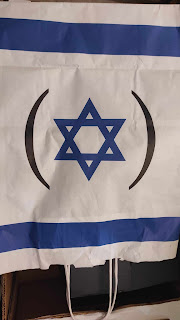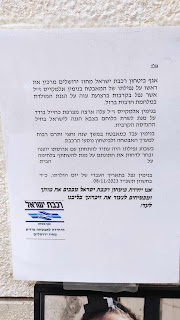I was looking up some farm volunteering requests for a friend in northern Israel when an update caught my eye.
Many thousands of Israelis have had to evacuate their homes in towns and villages close to the Lebanese border.
Many of these are farming communities and while most of the population have been displaced, a handful have stayed on to care for orchards and livestock which can't simply be moved to a safer region.
A few days ago a dash cam on the car of a volunteer couple from central Israel captured a fleeting glimpse of a large Iranian made anti-tank missile zooming in front of their vehicle in the northern moshav of Dovev.
In some of these cross border attacks Israeli civilians have been wounded. Last month Israeli electric company workers repairing infrastructure damaged by Hizballah fire were injured by yet another anti-tank missile, one later died of his wounds. In the western Galilee a farmer was killed by another anti-tank missile while tending his orchards.
Despite the attacks though these are farms vital for Israel's food security. I've seen regular calls for help collecting eggs and caring for livestock on Dovev and people responding by asking which day or time they can come - egg collecting is ideally an early morning activity.
Today though there was a sad caveat to the call for volunteers. Due to the escalation in Hizballah attacks, including 30 rockets fired today alone in the Rosh Hanikra area of north-west Israel, the army has issued new guidelines for agricultural work in farms near the Lebanon border.
From now on they are only to work after dark, from 6pm onwards. The anti-tank missiles fired at the chicken farm in Dovev over the last week seem to have clearly been targeting the farm workers and facilities.
Photo from the Yediot Ahronot newspaper shows the chicken shed in Dovev damaged by a Hizballah anti-tank missile and photo below from Israel's Kan 11 news channel showing the fleeting dash cam image of an Iranian made anti-tank missile hurtling in to Israel.








.jpg)

.jpeg)
.jpeg)

.jpeg)
.jpeg)

.jpeg)











.jpg)



























.jpg)
